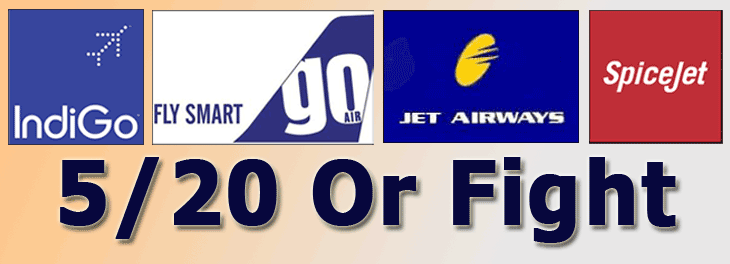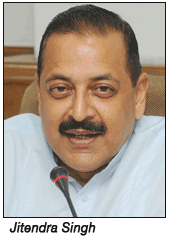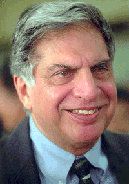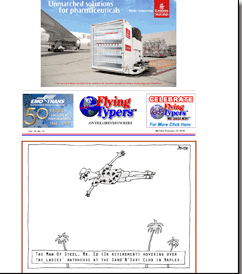
(Delhi Exclusive)
Even as air cargo went center stage last week in Mumbai,
elsewhere India’s top air cargo practitioners
were discussing how India’s transportaton sector
was expected to grow by more than 180 percent within
the next 15 years—a large part of which will be
due to Prime Minister Narendra Modi’s ‘Make
in India’ campaign. However, a battle royale is
shaping up between the government’s civil aviation
ministry and the non-government airlines.
In fact, these airlines
make up a tough body, holding control over more than
90 percent of the aviation market in the country.
The point of contention:
the much-hyped and yet-to-be announced National Civil
Aviation Policy (NCAP).
Airlines
Versus NCAP
 Pitted
on the side of the private airlines are IndiGo, Jet
Airways, SpiceJet, and GoAir, grouped together under
the flag of the Federation of Indian Airlines (FIA),
while on the other side is the Ministry of Civil Aviation. Pitted
on the side of the private airlines are IndiGo, Jet
Airways, SpiceJet, and GoAir, grouped together under
the flag of the Federation of Indian Airlines (FIA),
while on the other side is the Ministry of Civil Aviation.
FIA has made it quite
clear that the NCAP would be unacceptable if it were
to come out in its present form since it will only benefit
two carriers.
(A draft has been in
circulation since October 30, 2015. “The same
is available for stakeholder’s consultation and
comments on the website of this ministry at http://www.civilaviation.gov.in,”
a circular from the Ministry of Civil Aviation mentioned.)
The FIA has pointed a
finger at two airlines: Vistara and AirAsia India. Incidentally,
both have links with the venerable and respected Tata
group.
While Vistara is a joint
venture between Tata Sons and Singapore Airlines, AirAsia
India is a joint venture with Air Asia Berhad holding
49 percent of the airline, Tata Sons holding 40.06 percent,
and Telestra Tradeplace holding the remaining 10 percent.
In fact, AirAsia was
the first foreign airline to set up a subsidiary in
India.
The
5/20 Rule
FIA is most upset
about the 5/20 rule, which the policy would disgard.
Put simply, the rule states that every airline in the
country must complete five years of domestic flying
and have 20 aircraft in its fleet before it can apply
for permission to fly abroad.
That norm certainly disqualifies
the two Tata-funded airlines from flying abroad. There
are two other points to which FIA has said it does not
agree: the auctioning of bilateral rights and enhancing
the foreign ownership of domestic airlines to above
49 percent.
Among the airlines in
FIA, only GoAir does not fly abroad.
The FIA authorities have
said, “the 5/20 rule cannot be thrown out arbitrarily.
“The rule has to
be seen in conjunction with the Route Development Guidelines,
that orders all nationally permitted airlines to have
flights to unprofitable, remote sectors like the North
East of India.”
The order also says that
any carrier withdrawing flights from these areas would
have to take permission from the authorities before
doing so.
Rahul Bhatia, Chairman
of FIA and owner of IndiGo, was forthright when he said
that if the civil aviation ministry did not listen to
the FIA, there would be no other option left but to
seek the help of courts.
He told FT that
FIA did not want legal battles.
“We just want a
level playing field,” he said.
 Tata
Tweets Tata
Tweets
Ever
since the draft policy was announced, private airlines’
owners and representatives have voiced their concerns.
The latest spark, however,
came in late February (21) when the Chairman Emeritus
of Tata Sons, Ratan Tata, tweeted that he would like
the government to do away with the 5/20 rule.
“It is sad to see
incumbent airlines lobbying for protection and preferential
treatment for themselves against the new airlines that
have been formed in full compliance with prevailing
government policy and providing air transport to Indian
citizens in line with the dream of a ‘new India’
promised by the new government under (Narendra) Modi’s
leadership,” Tata said.
He was speaking about
Vistara and AirAsia India.
SpiceJet
Tizzy

The
tweet sent the world of aviation in a tizzy. Ajay Singh,
(right) CEO of SpiceJet, shot off:
“All of us were
asked to serve our great country before we got profitable
rights to fly abroad.
“We served with
great pride.
“What is wrong
if these two foreign-controlled airlines are also asked
to serve India before being allowed to fly international?
“Mr. Tata, whom
we respect greatly, should in fact urge these airlines
in which his group is a shareholder to serve India willingly
before being allowed to fly international.
“While obtaining
a license, these two airlines had undertaken to follow
the 5/20 rule, a rule they are now opposing so vehemently.”
IndiGo
By Ghosh!
IndiGo’s
President Aditya Ghosh (below) also joined in: “While
an IndiGo with more than 100 aircraft cannot restructure
its network by withdrawing from any unprofitable routes,
an airline with just five aircraft can fly abroad with
the sixth one—this is not acceptable.”
 Sometime ago, a high-level FIA delegation comprising
IndiGo’s Rahul Bhatia, SpiceJet’s Ajay Singh,
and GoAir’s Jeh Wadia handed a note to Jitendra
Singh, the Minister of State in the Prime Minister’s
Office.
Sometime ago, a high-level FIA delegation comprising
IndiGo’s Rahul Bhatia, SpiceJet’s Ajay Singh,
and GoAir’s Jeh Wadia handed a note to Jitendra
Singh, the Minister of State in the Prime Minister’s
Office.
The note mentioned that
FIA’s views were not being heard out in the formulation
of the NCAP.
A government press release
mentioned that FIA “sought Government’s
intervention to incorporate some of their concerns while
finalizing the National Civil Aviation Policy being
prepared by the civil aviation ministry … They
complained that while no other country in the world
allows substantial ownership and effective control of
its airlines to be taken over by foreign airlines.”
Who
Controls What?
India
has permitted some airlines to operate despite being
effectively controlled by their foreign parent. The
Minister supposedly told the delegation that their views
would be sent to the Ministry of Civil Aviation.
Whatever the outcome
of the war of words, Minister Mahesh Sharma, the Minister
of State for Civil Aviation, commented that “as
an Indian citizen, he (Ratan Tata) has given a suggestion.
“We welcome his
suggestion.
“We will try to
take a call on his suggestion. “The government
will have take a call at the right time.”
 Reacting to the allegations,
a statement has been issued by Tata Sons mentioning,
“both Tata SIA Airlines (Vistara) and Air Asia
India have transparently shared their views on the policy,
like other stakeholders.” Reacting to the allegations,
a statement has been issued by Tata Sons mentioning,
“both Tata SIA Airlines (Vistara) and Air Asia
India have transparently shared their views on the policy,
like other stakeholders.”
The statement goes on
to point out: “Keeping the national interest in
mind, Tata Sons believes that the 5/20 rule must be
abolished if Indian aviation is to achieve its full
potential and improve India’s connectivity with
the world.
“Apart from the
fact that there are no global parallels to this rule,
the rule is discriminatory to Indian airlines as foreign
airlines that do not meet these criteria are allowed
to operate in Indian skies, but Indian airlines cannot
enjoy reciprocal rights. Indian carriers are best placed
to promote India as a tourism destination and should
be encouraged to provide international connectivity
if they wish to do so…
“The 5/20 rule
has thus far principally benefited only foreign airlines,
who have captured 70 percent of the international traffic
with India, taking Indian jobs and revenue with them.
“This has also
resulted in poor utilization of bilateral air traffic
rights by Indian operators.
“The removal of
the 5/20 rule is estimated to boost international traffic
to and from India to over 100 million passengers by
FY2021, compared to 43 million in FY2014.
“This would stimulate
the domestic market, and the resultant growth would
help all domestic carriers.”
Utilizing its unique
on-the-ground access in India, FlyingTypers will continue to follow the story and keep our readers
posted.
Tirthankar
Ghosh |




 Tata
Tweets
Tata
Tweets

